Box is #4 in Top 10 Cloud Storages
Box offers free cloud storage and file sharing services that enables you to securely share and access files online. Companies rely on Box because it's secure, works on any device and scales to meet the needs of small businesses and Fortune 500 companies.
Positions in ratings
#4 in Top 10 Cloud Storages
Alternatives
The best alternatives to Box are: DropBox, Google Drive, OneDrive, Egnyte, iCloud
See also:
Top 10 Cloud Storages for business
Top 10 Cloud Storages for business
Latest news about Box
2023. Box announces Hubs, a custom portal to share specialized content
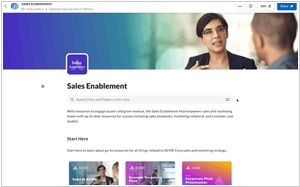
Box has introduced Hubs, a novel tool tailored for crafting centralized microsites to share specific types of content. Essentially, Box Hubs enables users to curate content from their Box account and disseminate it to their chosen audience in a customized and curated manner within their business. The potential applications for this tool are virtually limitless. It manifests as a specialized portal intended to house items such as HR policies, brand assets, or the most recent pricing details for a sales team. In conventional files and folders, these scenarios might lose their clarity, but within a portal, their purpose remains evident. The hub format offers a meticulously curated set of information for easy searchability—a concept that Box co-founder Levie acknowledges was not fully explored until the emergence of ChatGPT last year.
2021. Box acquires eSignature startup SignRequest for new content workflows
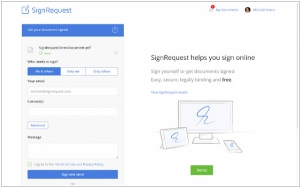
Box has announced its acquisition of SignRequest, an e-signature startup, for a sum of $55 million. This strategic acquisition fills a crucial gap in Box's offerings, providing the company with a native signature component that was previously absent from its platform. By incorporating SignRequest's technology, Box gains the ability to offer seamless e-signature capabilities directly within its platform, enabling new workflows and enhancing user experiences. The importance of remote work has become increasingly evident, particularly during the pandemic, as it offers enhanced safety and flexibility. Even in a post-pandemic world with a return to more face-to-face interactions, the ability to perform tasks entirely in the cloud and eliminate paper-based workflows will significantly accelerate processes and enhance overall efficiency.
2020. Box adds new collaboration capabilities
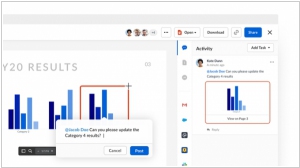
In response to the ongoing pandemic, Box is introducing new collaboration features. One of the key updates includes a cleaner interface, enhancing user interactions and file sharing capabilities. Additionally, Box is introducing a feature called Collections, which empowers users to organize their files and folders in a manner that suits their specific needs. This organizational structure is customizable on an individual basis. Furthermore, Box is incorporating an annotations capability, enabling users to easily add comments to files, either as a single editor or in a group discussion. Similar to collaboration tools in Google Docs, this functionality facilitates remote real-time commenting on any document, which is particularly valuable in the current environment. Lastly, Box allows external partners and customers to share files via a dedicated landing page, enhancing collaboration and information exchange.
2020. Box adds automated malware detection to Box Shield security product
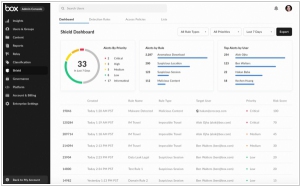
Box has introduced automated malware detection tools to enhance Box Shield, its security offering unveiled in the previous year. The company is employing a three-fold strategy with this solution. Firstly, users will be able to preview files without the need to download them, while receiving indications of any associated risks. Secondly, the system will proactively block the downloading of files that contain malware. Lastly, the security team will be promptly notified when a malware-infected file is uploaded to Box.
2018. Box acquired workflow automation startup Progressly
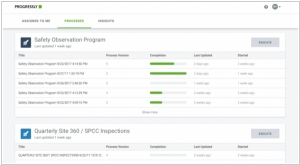
Box has recently acquired Progressly, a startup specializing in workflow management. In 2016, Box introduced its own workflow tool called Box Relay, in collaboration with IBM, targeting large enterprises. While Box Relay has proven valuable for well-defined processes within companies, such as contract management or employee onboarding, Box aims to expand its capabilities and create a wider range of workflows. The addition of the Progressly team to Box's workforce will facilitate this expansion. With their expertise, Box will be able to develop workflows that not only operate within the Box platform but also integrate with external workflow engines like Pega and Nintex. This integration will enable the creation of more complex automation scenarios using the comprehensive suite of Box tools and services. Such workflows can involve both internal employees and external organizations, allowing for sophisticated content movement and management beyond the capabilities of Box Relay.
2017. Box applied AI to content management
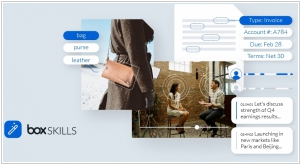
Box has recently introduced Skills and its accompanying SDK, known as Skills Kit. These new offerings empower organizations and developers to extract valuable insights from their extensive content repositories within Box datasets, utilizing machine learning techniques to unlock the inherent commercial value of their content. Box is currently showcasing three initial Box Skills, leveraging machine learning tools from Google Cloud and Microsoft Azure to address common business use cases. These include image recognition, which involves detecting objects and concepts within image files, performing optical character recognition (OCR) to extract text, and automatically assigning keyword labels to images for efficient metadata creation. Additionally, Box Skills encompass audio transcription and analysis, enabling the creation and indexing of text transcripts from audio files for seamless search and manipulation across various use cases. Lastly, video indexing employs text transcription, topic detection and indexing, and facial recognition to analyze video files comprehensively.
2017. Box introduced Box Elements - pre-packaged content services for developers
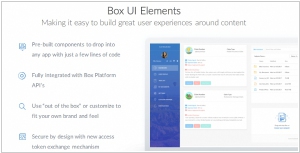
Box has unveiled a new developer tool called Box Elements, consisting of pre-packaged application components aimed at providing Box functionality through minimal lines of code. Over time, Box intends to offer three categories of Elements: UI, app, and services. The initial release focuses on the UI components, encompassing various functionalities. These include Content Uploader, which facilitates drag and drop file capability within any application; Content Explorer, allowing developers to embed Box file navigation into their applications; Content Preview, enabling the display of over 120 file types, including interactive video, within an application; and Content Picker, which empowers developers to integrate file picking capability within an application. While these capabilities may not appear groundbreaking, developing them from scratch would consume considerable development time. Box's offering allows for swift implementation without the need for extensive content expertise, enabling developers to expedite their projects.
2017. Box introduced desktop app Box Drive
Box has introduced Box Drive, a desktop application compatible with both Windows and macOS operating systems. This application enables users to create, edit, locate, and share files without the need for a web browser. By seamlessly integrating with the desktop environment, Box Drive functions as an additional drive on the computer, similar to the local C drive, providing a more streamlined and intuitive file management experience. While the application itself is free, large enterprises such as General Electric, P&G, and The Gap have the option to subscribe to Box for enhanced functionality. Existing customers will have access to the full range of capabilities offered by Box Drive. Notably, Box recently announced its integration with Apple's new Files app, which offers an additional avenue for accessing Box documents across iOS devices.
2016. Box Zones will let you choose storage from IBM and AWS
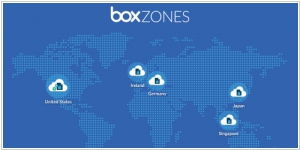
Enterprise file collaboration service Box has introduced a new product called Box Zones, which provides customers with the option to select a storage solution from a different vendor. This feature enables customers to comply with privacy laws by storing their files in the same country. Initially, Box Zones will be available on Amazon Web Services in Ireland, Germany, Japan, and Singapore, with plans to expand to additional zones using IBM data centers later this year. Ultimately, Box aims to offer flexibility by allowing customers to integrate any approved storage solution of their choice. With Box Zones, customers in Asia, the Middle East, and Europe can fulfill legal and regulatory requirements by storing their content in-country using third-party storage, while still leveraging the comprehensive features and services provided by Box.
2014. Box introduced new mobile web interface
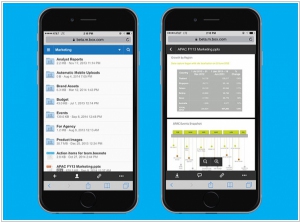
Cloud file collaboration service Box has announced the release of its updated mobile website (m.box.com) and accessibility site (a.box.com). With this update, Box mobile web users can now enjoy the same user-friendly navigation and visually appealing interface as offered by Box's native mobile apps, eliminating the need to install a separate mobile application. Alongside a refreshed layout and visual design, Box has introduced several new features. These include high-fidelity HTML5 document previewing, enhanced collaboration capabilities that encompass inviting and managing collaborators, fine-grained file sharing controls for establishing and modifying shared links, support for Box Notes, and optimized performance for faster loading times, especially over cellular networks. The improved file preview experience simplifies content sharing, allowing recipients outside of your organization to preview and provide comments on Box content directly from their mobile web browser, facilitating seamless collaboration even while on the go.
2014. Box unveiled world's first industry specific file storage
The file storage and sharing market has become highly competitive, with pricing reaching near-zero levels and cloud storage capacity expanding exponentially. Supporting multiple platforms is no longer a unique selling point; it has become a necessary feature for providers. Consequently, providers are compelled to innovate and differentiate themselves. One such example is Box, which has chosen to tailor its file storage services to specific industries such as retail, medicine, media, and education. Although there may not be significant differences in storing and sharing files between these industries, Box's marketing team has created captivating videos and customized web pages for each sector. This demonstrates the service provider's commitment to understanding the unique requirements of different businesses. Additionally, Box has plans to introduce a new component called Box Workflow, designed to streamline business processes, complete with industry-specific process templates, starting from the next year.
2014. Box Notes is available on Android
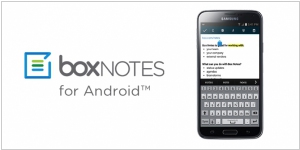
Box has released an update for its Android app, introducing the inclusion of the lightweight document editor, Box Notes. With the latest version of Box for Android, users can now create, view, and edit Box Notes directly within the app, similar to the web version. Box Notes on Android seamlessly integrates with the native menus, providing access to essential editing features such as cut, copy, paste, bold, italic, underline, bullet lists, numbered lists, indenting, and outdenting. Additionally, users can now create checklists using Box Notes across web and mobile platforms, with the interface available in multiple supported languages. The Android update also introduces several other productivity-enhancing features, including a recently opened files section, advanced settings for shared URLs, and more extensive administrative controls.
2014. Box gives businesses unlimited storage, adds Office 365 integration
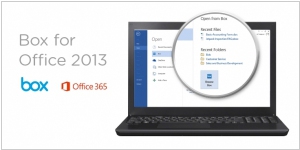
According to Box CEO Aaron Levie, the era of Cloud Wars has come to an end, at least in terms of cloud storage costs. Starting now, the standard price for this resource is zero. In other words, Box's cloud storage for business no longer imposes any restrictions on the size and quantity of files that employees can upload to their online accounts. It is worth noting that Google recently introduced the enterprise version of Google Drive with unlimited cloud storage as well. In addition to unlimited storage, Box has also introduced integration plugins for Office 365. The first plugin, designed for Outlook, enables users to conveniently attach file links from Box to their emails instead of sending the actual files. The second plugin, for desktop Office editors, allows users to access and edit documents directly from Box's online storage and save them seamlessly.
2014. Microsoft is already afraid of Box
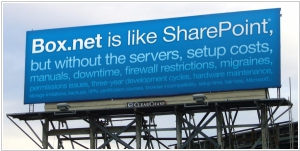
We have been closely following the ongoing competition between Box and Microsoft, dating back to the time when Box was a small and audacious startup that playfully taunted MS Sharepoint. However, the tables have turned, and now Microsoft is genuinely concerned about Box's impact. In a recent blog post on Microsoft's website, they announced yet another price reduction for their OneDrive cloud storage, cleverly titled "Thinking outside the Box". This move indicates Microsoft's apprehension and the need to stay competitive. Adding to their worries, Box recently made headlines by securing a major client - General Electric. This deal entails 300,000 users and significant annual revenue, seemingly snatched away from under Microsoft's nose. Furthermore, today, Box has fulfilled its promise by introducing Box Notes, an online text processor that will soon rival MS Word. The battle between these two companies is heating up as they vie for dominance in the market.
2013. Box provides 10 Gb for free and new cheap version for small business
The SaaS file collaboration service, Box, is highly commendable. It's common for startups like Box, having achieved significant milestones such as 180,000 business customers and securing partnerships with prominent corporations like Procter & Gamble, Eli Lilly, EA, and NBC Sports, to overlook individual users with free accounts and small businesses in favor of maximizing profits. However, Box breaks this trend and prioritizes all users. Recently, Box increased the free cloud storage limit for individuals to 10 GB and introduced a new cost-effective option for small businesses: 100 GB for $5 per month per user. This pricing is approximately half the cost compared to competitors like Dropbox, for instance. Furthermore, it's important to highlight that Box offers more than just cloud storage—it provides a collaborative workspace with features such as access control, comments, tasks, version history, file synchronization across devices, mobile accessibility, and online editors.
2013. Aaron Levie answered to the Ultimate Question of Life, the Universe and Information Technology

This question may sound in different manner, for example: "What's better, iPhone or Android?", or "What to choose, Amazon or OpenStack?", or "Who will win, Skype or SIP?". In other words, what's better: a finished product made by one vendor or open ecosystem, where you can select the best components from different vendors? Last week news helped Aaron Levy (Box.com CEO) to find the answer for this Ultimate question. Of course, finally, he came to the conclusion that is beneficial to him, but his ideas are anyway very interesting (original here). ***
2013. Box makes friends with Big Guys. Gives 50 Gb for free and forever
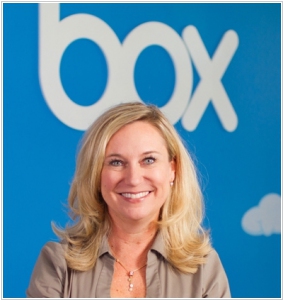
Not long ago, Box was a startup in the file storage and collaboration service industry. However, they have since forged alliances with prominent IT giants. Most recently, IBM and Oracle integrated their respective products, IBM Connections and Oracle Fusion Applications, with Box's cloud storage. Additionally, Box has partnered with Dell to offer a unique joint promotion: anyone can now access 50 GB of cloud storage for free, indefinitely, without any conditions or the need to purchase a Dell computer. Furthermore, Whitney Bouck, General Manager of Enterprise for Box (pictured), expressed that "There's one camp that is all about sync and share - that's not that interesting. It's a commodity and probably should be free. Collaboration - making it easier to work together - is where it gets interesting."
2012. Aaron Levie Gangnam Style dance on BoxWorks stage. Box new version
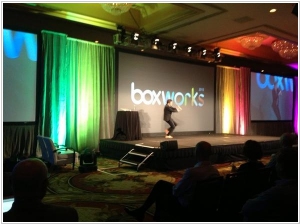
After enchanting Dreamforce conference there was another big conference Oracle Open World. But this time, Larry Ellison gave us no interesting reason to post news about it. Conclusion: do not buy anything from Oracle, they are so boring. But the BoxWorks conference, recently held in San Francisco, was not less interesting than Dreamforce and Box CEO Aaron Levy - is a showman, no worse than Marc Benioff. For example, during his keynote, he danced Gangnam Style (photo). The Twitter founder Jack Dorsey calls Levi his favorite entrepreneur and the funniest tech CEO. But Box makes not only show, but also business. According to the latest data, Box is already used by 92% of the Fortune 500 companies and by 14 million users in total. ***
2012. Box and Dropbox implemented two-step login verification
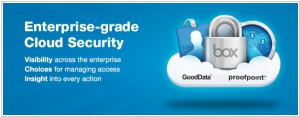
Online file storage and sharing service Box is continuing its preparations for competition with Salesforce. Currently, Box developers have made significant enhancements to the security features, with the introduction of two-factor authentication. By enabling this feature in your account, you will receive an SMS message containing a security code each time you log in, similar to how it operates in GMail. Furthermore, Box has introduced additional functionalities for business account administrators. They now have the ability to monitor newly uploaded and shared files, as well as receive alerts for any suspicious activities, such as a user initiating multiple file downloads simultaneously. Another competing service, Dropbox, had previously implemented two-factor authentication in August. Furthermore, today, they have added a new feature to the admin panel in the business version of Dropbox for Teams. This feature allows administrators to view which team members have activated two-step verification and send direct emails to those who haven't, all from the control panel.
2012. How Box is going to fight Salesforce? Speed.
Today marks the commencement of the Dreamforce conference, where we anticipate numerous updates on new Salesforce products. Among them is ChatterBox, an online file storage service that may bring concerning news for Box.net. Rumor has it that Marc Benioff decided to create this rival service in response to some Salesforce executives joining Box. The confrontation between these two companies has already begun, despite Salesforce being one of Box's shareholders. However, Box is no longer a fledgling startup that will simply hold its breath and wait for the big brother to crush its business. Box is taking proactive steps forward. Just ahead of the Dreamforce launch, Box has introduced its new global data transfer network called Box Accelerator, which enhances data upload speed to Box.net by 10%. Box now proudly claims to enable data uploads twice as fast as Google Drive and four times faster than Dropbox. After all, speed is crucial for your business, isn't it?
2011. Box.net is getting serious about SharePoint with another $81m of funding

A couple of years ago it was funny to watch the cheeky advertising by Box.net, in which the startup attacked the giant SharePoint. But it turned out that Box.net can not only do a noisy PR, but also can effectively run its business and develop the high-quality product. This week the company raised another $81 million of investments from SAP and Salesforce, and its market value was estimated at $600 million. Box.net currently has 100 thousand customers (7 million users). 77% of Fortune 500 companies use Box.net. And this summer the startup succeeded in signing its biggest contract - with Procter & Gamble for 18,000 seats. Box.net is the mobile collaboration market leader according to Forrester. So what is the secret of their success? ***
2011. Box.net connects Microsoft Office, Windows and Mac to the Cloud
Box.net CEO, Aaron Levy, came up with a new beautiful term "Smart Enterprise". Aaron opposes it Benioff's "Social Enterprise", hinting that a company (and business applications) in result should smart rather than social. And the main goal of business application is not to connect person to person but to connect person to needed content. So in general, all this stuff is quite abstract and unclear, but it sounds good and perfectly fits into Box.net mission - to provide a single, centralized cloud content repository for Enterprise. Box.net wants to integrate content from all (isolated) business applications, computers, mobile devices, offices to ensure that each employee can access the right content at the right time. To achieve this, Box.net has released two major components: Box for Microsoft Office and Box Sync. ***
2011. Forrester calls Box.net the leader in mobile collaboration
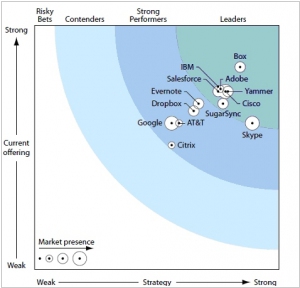
Forrester Research, the technology and market research company decided to create a report on the mobile collaboration market. Why mobile? After all, there are no purely mobile collaborative solutions. Mobile access - is just a feature in such systems. But apparently, this feature has become so important that it deserves a separate report. So the results of Forrester research - on the chart. The results - are quite strange. For example, Google (which provides the cool mobile access to almost all their services) is behind the most leaders. And Microsoft - is absent (while it's new department Skype has the best mobile strategy). But the chart leader - Box.net is really showing the great progress in recent months. ***
2011. Google and Box.net prepare to meet Office 365
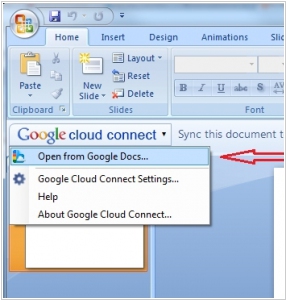
Next week Microsoft will officially launch its online office suite Office 365, and of course, the major competitors, Google and Box.net, want to spoil this party. First, they have integrated their solutions. Now Box.net users can edit any stored document in the Google Docs online editors. In addition, they can (in just one click) create new documents in Box.net folders by opening Google Docs apps. Recall that Box.net also features the similar integration with Zoho Docs, so now users will have a choice. Box.net CEO, Aaron Levy, says that he played with the beta version of Office 365 and that it’s lacking the power and functionality of the bunch Box + Google Docs. ***
2011. Amazon Cloud Drive vs. Microsoft SkyDrive vs. Google Docs vs. Box.net
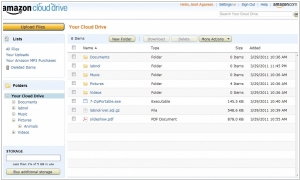
Last week, Amazon launched the new online file storage service Amazon Cloud Drive. And taking into account reputation of Amazon, as the online storage market leader, this event, of course, deserves our attention. Let's consider the advantages and disadvantages of this service compared to key competitors. The main parameters - are shown in the table (below). It's turns out that the main advantage of Amazon Cloud Drive - if free 5GB account with maximum file size of 2GB. However, its main drawback negates this advantage: you can not share this large file with anyone. Amazon Cloud Drive doesn't allow to share files publicly or protected by password. I.e. the only way of using this service - is a private storage for backup or enhancing your productivity. ***
2011. Box is getting realistic about Sharepoint
As known, Box.net always positioned itself as a Sharepoint alternative. The entire marketing strategy of Box.net has been built on Sharepoint criticism. They created billboards criticizing Sharepoint, distributed T-shirts with the sign "No Sharepoint", collected negative reviews about Sharepoint in Twitter, etc. But business - is business. And Sharepoint - is Sharepoint. This is perhaps the most successful IT system over the last several years. And it's linked to so many others business applications that persuading a company to change Sharepoint to something else - is unreal. So Box.net accepted this fact and came up with the new strategy: now Box.net will be the front-end to Sharepoint. And also to others ECM systems. ***
2011. New Box.net: more simple, social and with App Store
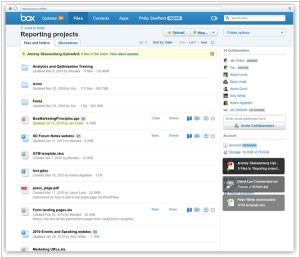
Business applications should be simple - this is the favorite phrase of Aaron Levy, the founder of collaboration service Box.net. And the main feature of the new Box.net version is again more simple and intuitive interface. It was very simple before also, but Box.net developers continue to redraw and rearrange buttons, icons, menus to make the users even more happy. The new interface is implemented on HTML5 and it allows to open and view files online faster. Also, there are new convenient tools like instant pop-up notifications (imitating Windows tray notifications) and drag and drop support for moving files between folders. In addition, now it's possible to attach discussions not only to files but also to folders. It's useful for discussing projects. ***
2010. Cloud Content Management - the future of ECM?

Recently we have taken a look at what stage is the introduction of Enterprise 2.0 technologies in the ECM systems. What will these systems look like in the future? Perhaps they will look like Box.net. At least, Aaron Levy, the founder of Box.net believes it's true. He even invented the term "Cloud Content Management" as an alternative to Enterprise Content Management. While this term is mainly for marketing purposes, however, some Box.net ideas really can become the basis of ECM 2.0. The main promise of ECM is creating a unified information space in enterprise. ECM is intended provide user a unified access to all data, regardless of in what repositories/applications this data is stored. But what if a company uses one or more SaaS-applications from different providers? ***
2010. Aaron Levie: Enterprise apps are sexy

A few years ago (like many startupers now) Aaron Levie, Box.net founder, was making a choice - what service to create. Now he tells why he had chosen the business application. Of course, every entrepreneur wants to create something cool and sexy, something that people will like - he says. And it's usually associated with such projects as Facebook, Twitter or YouTube. But Aaron is sure that it's time for business apps to become "sexy." For many years, enterprise IT systems looked just as sexy, as Steve Ballmer in bikini. Due to the lack of competition (when a partner network was the major success factor), they were complicated, awkward and expensive. The emergence of SaaS and Cloud Computing technologies enables young companies relatively easily deliver new business apps. As a result, the market becomes more competitive, and forces IT systems to change. ***
2009. Online file collaboration: DropBox Vs Box.Net
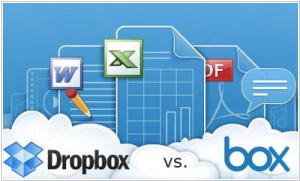
DropBox and Box.net - are, probably, the most popular and successful online file sharing and collaboration services. And though they use two different approaches to the SaaS file storage, they both have alike strategy, supposing constant upgrades and new features development. During the recent months both services did a good job and it's interesting to compare their results. ***
2009. Box.net has partnered with Fuze Meeting
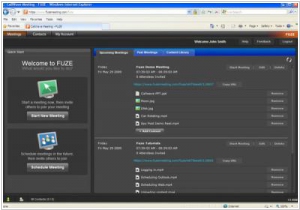
Box.net has formed a partnership with Fuze Meeting to enhance its online office suite by integrating real-time online meetings and screen sharing capabilities. By leveraging Fuze as part of your Box account, you can now conduct meetings, share your desktop (requiring a download), and upload your Box files to a collaborative space within Fuze. This integration of Fuze Meeting into Box's OpenBox system expands the range of services that users can connect with their Box account, including popular options like Gmail and Zoho. While Fuze competes with well-established services such as WebEx and GoToMeeting, this collaboration with Box could provide a significant advantage by tapping into the enterprise user base that is more receptive to adopting new SaaS tools. This partnership has the potential to contribute to Fuze's market share growth in the industry.
2009. Box.net adds tasks and public folders
Box.net, the web collaboration service, has introduced three new features to enhance user experience. The first addition is the tasks feature, allowing users to assign specific tasks to files. Initially, the service offers three actions (approve, update, and review) that can be assigned to oneself or others. Upon task completion, users can include a personalized response, which is then sent to the assigner, while the original task request is crossed out, ensuring clear project tracking. However, custom tasks cannot be saved for future use. Furthermore, business users now have the option to customize the Box.net workspace with a company logo and color scheme, which will be visible to team members and individuals granted file-reading privileges. Additionally, the platform allows the creation of "global" folders, each with a unique URL chosen by the creator. These folders serve as permanent storage locations accessible to anyone with the URL, who can also subscribe to receive email notifications when new files are added. Unfortunately, RSS functionality is not available for folder subscriptions, and users must sign up using their Box.net credentials.
2009. Box.net will search in text within documents
Box.net is introducing an updated search engine that allows users, including both free and business account holders, to easily search for specific information contained within the files they have stored on the platform. This enhanced tool now has the capability to index text within Microsoft Office documents, PDFs, user descriptions, and Box.net's native Web documents. Previously, this functionality was limited to using an appropriate OpenBox service to preview the file within the browser. With this improvement, users can quickly locate relevant content within their files directly through the search feature of Box.net.
2009. Box.net gets wiki-editor
Box.net, an online storage service, has introduced a new wiki tool designed for internal collaboration. This tool allows users to collaborate on a shared web document using the built-in editor. While simultaneous editing, as seen in Google Docs, is not available, the wiki tool provides essential features for creating robust documents. It automatically saves changes, enabling users to revert to previous versions if needed, although reviewing specific additions or replacements requires opening the file. Permissions management is also relatively user-friendly, although there are some minor issues. When initiating a document in a shared folder, collaborators are automatically selected, and users can then specify whether they have editing or viewing access. This feature is a promising addition and a clever way to enhance the platform's collaborative capabilities. Although integrating third-party services through Box's OpenBox service would have been preferable, the wiki tool serves as a valuable extension, particularly when combined with the platform's built-in discussion tools.
2009. Box.net gives businesses New Social Features
Box.net has unveiled a redesigned interface with several new collaborative features to target its new audience: businesses and enterprises. While continuing to provide its established storage solution, the company aims to attract paying business customers who have become its most frequent users. Since its launch in 2005 as a basic online storage site, Box.net has steadily expanded its functionality, introducing features such as a two-way storage widget, integration with popular web applications, and a Facebook application. Recognizing that businesses are its most engaged users, Box.net has focused on enhancing its collaborative and enterprise features to facilitate efficient file sharing among coworkers. To better suit group work environments, the company has revamped the interface, including a sidebar that highlights recently modified files and lists members working on them. Each user now has a profile page displaying contact information, a news feed of recent activity, and a list of common collaborators. Additionally, discussions and bookmarks can now be added to folders, enabling enhanced communication beyond simple file sharing.
2009. Box.net to beef up business tools with new hires
Box.net has recently made two notable additions to its team. The web storage provider announced the appointment of Jen Grant as the new VP of marketing and David Lee as the director of Product Management. Grant previously held the position of leading Google's marketing team for Google Apps, while Lee was responsible for integrating advertising into various video projects at Yahoo. In a brief interview on Box's blog, Lee expressed his intention to enhance Box's business and collaboration features. It is worth noting that Lee has prior experience as a UI designer for WebEx's MeetMeNow Web conferencing service, which could be seen as either positive or negative. Last month, Box initiated a beta program introducing new features tailored for small and medium-sized businesses, bridging the gap between their consumer and enterprise offerings.
2008. Box.net Releases Very Useful iPhone App
Box.net, an early player in the online storage and file sharing arena, has released a new iPhone application that pleasantly surprised me with its capabilities. During a conversation with Box.net's Community Manager, Sean Lindo, he mentioned the upcoming app, which initially didn't impress me much since everyone seems to be launching iPhone apps these days. However, after downloading and trying it out, I realized it was more than just a basic file browser. The app is impressively fast, even on a 3G connection. What sets it apart is its ability to preview various file types, including documents, PDFs, and images, which renders them beautifully, akin to email attachments in the phone's mail application. This feature will prove handy for reviewing documents while on the go. Tapping on an MP3 file launches the phone's iPod application and streams the audio. The app synchronizes changes between your Box.net account and the phone in real-time, making it highly convenient. Unfortunately, there's no option to reorganize files within the app, but you can share files with contacts via email and upload photos directly from the phone's camera. Existing Box.net users will find the app enhances their experience, while new users can sign up via the app to receive a free 1 GB account. Alternatively, subscription plans start at $7.95 per month for 5 GB of storage space.
2008. Box.net adds group collaboration to personal Web storage
Yesterday, Box.net introduced a new and valuable collaboration feature to its online storage service. Users now have the option to invite others as editors or viewers by right-clicking on a folder and selecting the collaboration feature. While Box.net previously offered linking and sharing options through its premium service and widgets, this new addition takes collaboration to a more advanced level. Collaborators can access shared folders directly in their Box.net storage area, and the service now includes versioning to track file edits and their contributors. Users can easily identify the latest edits and view the change history, allowing them to download previous versions or revert to an earlier state. This feature will particularly benefit image files, as it complements the editing tools provided by Picnik and Snipshot through Box.net's API platform, OpenBox. There are a couple of limitations to note: collaborators must have a Box.net account, and free members are restricted to three shared folders and do not have access to versioning records like premium users. However, these limitations are not deal-breakers and are comparable to Google's collaboration approach with Docs and Spreadsheets.
2008. Box.net Raises $6 Million to Take Online File Storage to the Enterprise
Box.net, an online file storage and sharing solution, has secured $6 million in a Series B funding round led by US Venture Partners. The company has expanded its services beyond personal file storage and now serves as a storage platform for third-party services like Zazzle and Zoho through OpenBox. While Box.net initially gained popularity for its free personal file storage and sharing capabilities, it has evolved to offer advanced features and increased storage capacity for business customers who pay a subscription fee. The funding will be primarily used to develop new features and partnerships to cater to enterprise users. With over 1.4 million registered users and a subscription-based business model, Box.net is on a clear path to profitability. It serves as a valuable tool for consumers to share files across different social networks and as a portable file storage solution for businesses adopting web-based office and project management tools. The company's consistent growth in traffic, up over 200% in the past year according to Compete.com, indicates its alignment with favorable industry trends and potential for a significant future exit. Draper Fisher Jurvetson, an investor from the Series A round, also participated in the funding.
2007. Box.net Launches OpenBox, an Online Storage Platform
Box.net is introducing a new feature called OpenBox, which allows third-party services to access your files directly through your Box.net account. Although OpenBox will officially launch next month, a soft launch is being conducted to demonstrate the expansion to third-party services. Participating companies in the soft launch include Zazzle, Picnik, Zoho, Myxer, Twitter, and Scribd. With OpenBox, when you right-click on a file in your Box.net account, you will see additional options related to these services. For example, by right-clicking on an image file and selecting Zazzle, you can utilize Zazzle's service to print the image on a t-shirt. OpenBox functions similarly to Facebook's platform but focuses on file-sharing rather than social networking. It provides third-party services with a way to enhance their offerings within Box.net. OpenBox presents a range of services that can be used with your Box.net files, and you can customize the right-click menu to include your preferred options. OpenBox enables easy access and utilization of third-party services while integrating Box.net with various web-based companies. It transforms Box.net from a mere file storage and sharing platform into a versatile tool for editing, modifying, and utilizing your files online.
2007. Box.net Launches Office On Demand
Box.net, the file hosting service renowned for its file-sharing widget, has unveiled a beta version of its latest offering, tentatively named "Office On Demand." This Microsoft Office plug-in empowers users to save files directly to their Box.net accounts with a single click from any application within the Office suite. Office On Demand allows for seamless editing of documents within Microsoft Office while retaining an online presence. This functionality proves valuable for individuals utilizing shared computers, seeking a mobile version of their files across multiple devices, or desiring easy file sharing through the Box.net widget. Box.net aims to achieve seamless integration of its online space and collaboration tools, viewing Office On Demand as the next step in this progression. Notably, the release of Box.net Office On Demand was made possible through its API, granting businesses the opportunity to leverage this plug-in for effortless file saving. Other notable players in this space include Zoho, Google Docs, ThinkFree, which recently launched a document sharing community, and Egnyte, offering a comprehensive solution for automatic file versioning from desktops.
2007. Box.net Launches File Sharing Widget
Box.net has recently introduced the Box Widget, a tool that enhances online collaboration among users. Website publishers now have the ability to integrate the widget into their websites or MySpace profiles, enabling visitors to publish files. For Pro users, the widget allows others to upload files directly and customize it according to their preferences. When a new file is added, it is stored in both the widget owner's Box account and the account of the person who uploaded it. RSS feeds are provided to notify users of any new content. Currently, the widget supports direct downloading of documents and streaming of images and videos, making it a versatile file-sharing solution. This widget facilitates collaborative album creation, accommodating documents, videos, and images, and exemplifies the increasing fluidity of social networking, enabling seamless transitions between different platforms. The widget presents media content similarly to Splashcast or Pickle widgets, displaying multimedia within the widget window. Allowing direct mobile access and submission would enhance its capabilities, enabling users to contribute content from their cell phones that would update in real-time on the widget. Additionally, enabling others to easily grab the widget would be a valuable feature to consider.
2007. Increased productivity care of Box.net and Zoho
If you prefer working exclusively in an online environment and rely on web-based tools for storage and document editing across multiple computers, you'll be interested to know about recent developments from Box.net and Zoho that can greatly enhance your productivity and reduce the need for desktop-based office suites. Zoho's API allows other companies to leverage their web-based productivity suite, opening up possibilities for integration. In January, Zoho also partnered with Omnidrive, an online storage service, enabling users to directly open their documents in Zoho's online applications with a simple click, eliminating the need for downloads. Box.net has now joined in by utilizing the Zoho API, offering its users the option to "Edit Document" on a text file directly within their Box.net storage accounts. When selected, a Zoho text editor opens in a new tab or window. While initially there may be some delay in connecting to the Zoho text editor when clicking on a .doc file, once logged in and in editing mode, the process works smoothly. Personally, I am considering using Box.net more extensively in the future. It begs the question: How long until Google releases its own online storage system? All the necessary components seem to be in place, just waiting for Google's entry into the arena.
2005. Online Storage: Box.net Rocks The Kazbar!
YYesterday, I had an email conversation with Aaron Levie from Box.net, a company that offers 1GB of storage for $2.99 per month, which I find to be a great deal. What's even better is that they don't charge anything for bandwidth usage. If you're interested, there's an interesting podcast interview with Aaron on Odeo. With the increasing use of mobile phones, online storage is becoming increasingly important, and it's fascinating to see where we stand currently. In my opinion, the future lies in thin clients and cellphones, with applications running on servers similar to Salesforce.com, and all our files stored on the network. So, how do the different players in the online storage arena compare? Well, let me tell you, Pete. Box.net has a sleek interface and their elimination of bandwidth charges has simplified the process for everyone. They even offer RSS feeds so you can subscribe to other people's files – very web 2.0! However, they don't have a blog yet, although Aaron mentioned that they're working on it. Another major competitor is Streamload, a storage site that focuses on music and video. Their pricing structure can be confusing, and their interface is more cluttered compared to Box.net, but they do have a great blog that gets updated fairly regularly (I'm subscribed to it). XDrive is another player in the field, and I believe it was recently acquired by AOL, but I could be mistaken (Fact-checking? Who needs it!). Wikipedia also has a list of online storage companies, which I plan to check out since I need to partner with one for my business. And if you know of any other online storage companies that should be added to this list, feel free to leave a comment, amigo!









